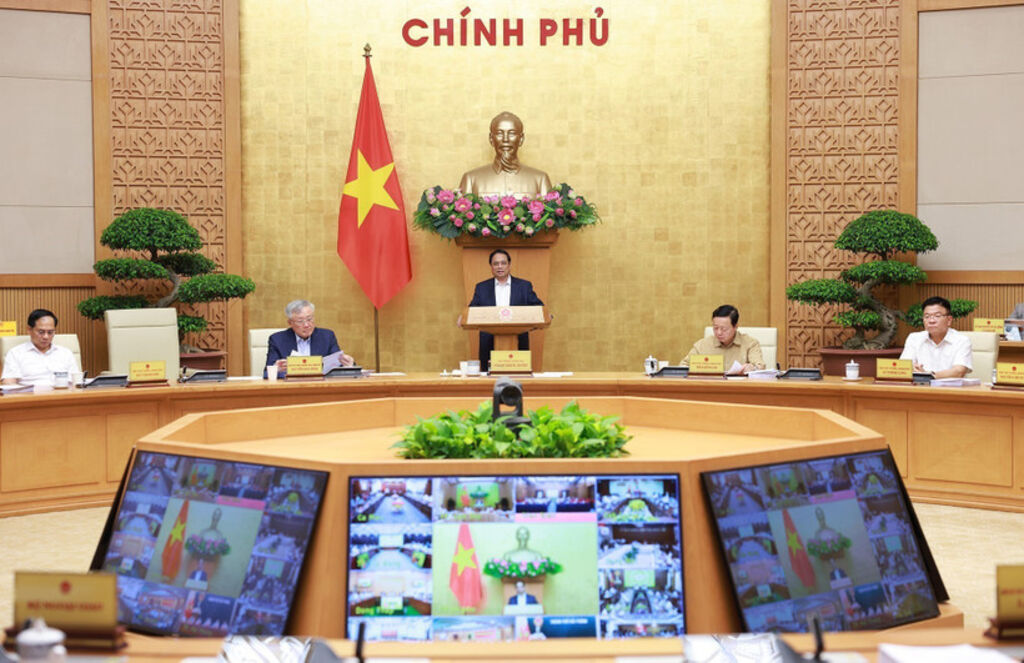 |
| Prime Minister Pham Minh Chinh chairs the regular June cabinet meeting and the national online conference between the Government and local authorities__Photo: VNA |
Vietnam’s socio-economic situation has shown steady improvement in the first half of 2025, with performance in most sectors in the following month better than the previous month and the next quarter better than the previous quarter, said Prime Minister Pham Minh Chinh on July 3.
PM Chinh made the remarks while chairing the regular June cabinet meeting and the national online conference between the Government and local authorities - the first of its kind held following the establishment of a two-tier local government system and the administrative restructuring that reduced the number of provinces and cities nationwide from 63 to 34.
"We have passed the first half of 2025 in a global context marked by numerous new, complex, and unpredictable developments with more challenges and difficulties than opportunities and favourable conditions," he noted.
He stated that the US imposed broad-based, high reciprocal tariffs, including on Vietnam; strategic competition between major powers intensified; and conflicts escalated in several regions. Global supply chains, particularly through the Red Sea, suffered partial disruptions; oil and gold prices had fluctuated sharply; climate change and natural disasters remained unpredictable; and global economic, trade, and investment recovery was slow and fragile.
Domestically, the Government leader said Vietnam made coordinated efforts to implement eight major tasks. These included the consolidation of administrative units and establishment of a two-tier local government system; the pursuit of high economic growth, targeting at least 8% in 2025; negotiations on tax matters with the US and the expansion and diversification of markets, products and supply chains; development and implementation of the Politburo’s “four-pillar” institutional framework; comprehensive preparations for the historic ninth session of the 15th National Assembly to deliver institutional reforms and enhance decentralization, delegation, and accountability; the preparation of documents for the 14th National Party Congress and the organization of all-level Party congresses; successful hosting of major national commemorative events; and accelerating the nationwide program to eliminate makeshift and dilapidated housing.
He highlighted that macroeconomic stability was maintained, inflation was under control, and major economic balances were ensured, with budget deficit and public debt well below warning thresholds. The agriculture, industry, and service sectors all posted positive growth. Cultural, social, and welfare policies were prioritized; people's living standards improved; political and social stability were maintained; national defense and security were strengthened; and diplomatic efforts were enhanced, preserving a peaceful and stable environment for national development.
PM Chinh requested participants focus their discussions on evaluating the socio-economic situation, public investment disbursement, and the implementation of national target programs. He urged them to analyze the domestic and international contexts and their impacts on Vietnam; the Government’s leadership and direction; the performance of ministries, sectors, and localities; and the outcomes in June and the first half of the year, including underlying causes and lessons learned.
He also called on delegates to assess both the positive and negative factors and propose appropriate response strategies; clearly define key tasks and solutions for July, the third quarter, and the remainder of 2025. He emphasized the need to stabilize the administrative apparatus at all levels; determine what each ministry, sector, and locality must do to meet or exceed the 8% growth target for 2025; implement mechanisms and policies to stimulate consumption; deploy effective fiscal, monetary, trade, and investment tools; accelerate public investment disbursement; and ensure progress in the three national target programs as well as in cultural, social, environmental, defense, security, and foreign affairs.
According to the agenda, the delegates will review the socio-economic performance of June and the first half of 2025; implementation of Government resolutions on socio-economic development; allocation and disbursement of public investment; execution of the three national target programs; state budget performance in the first six months of the year; the Government's leadership and management efforts; improvements in the business environment and national competitiveness; administrative reform efforts; and other important issues.- (VNA/VLLF)









